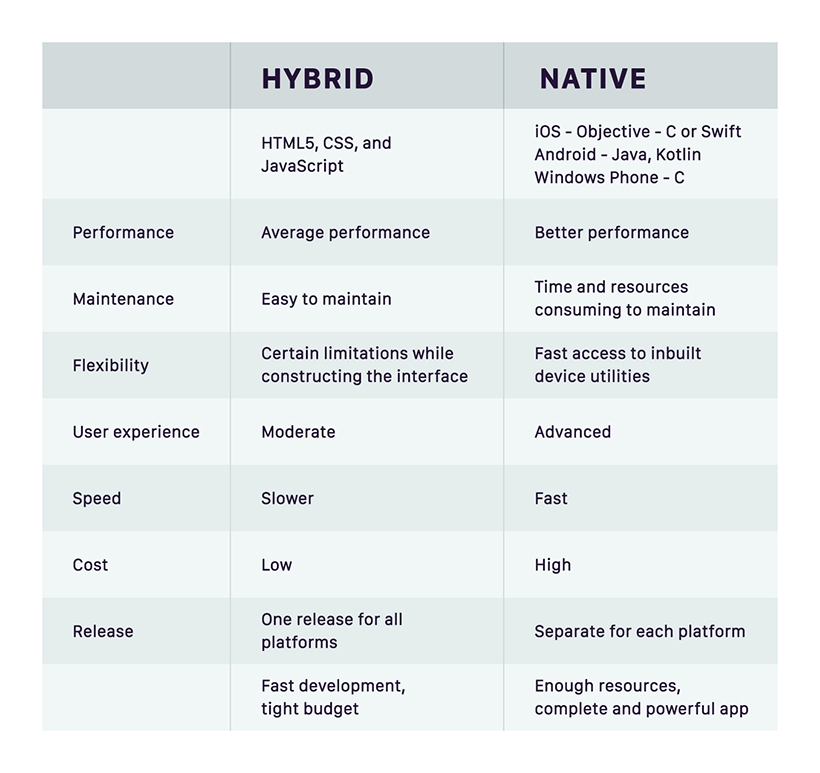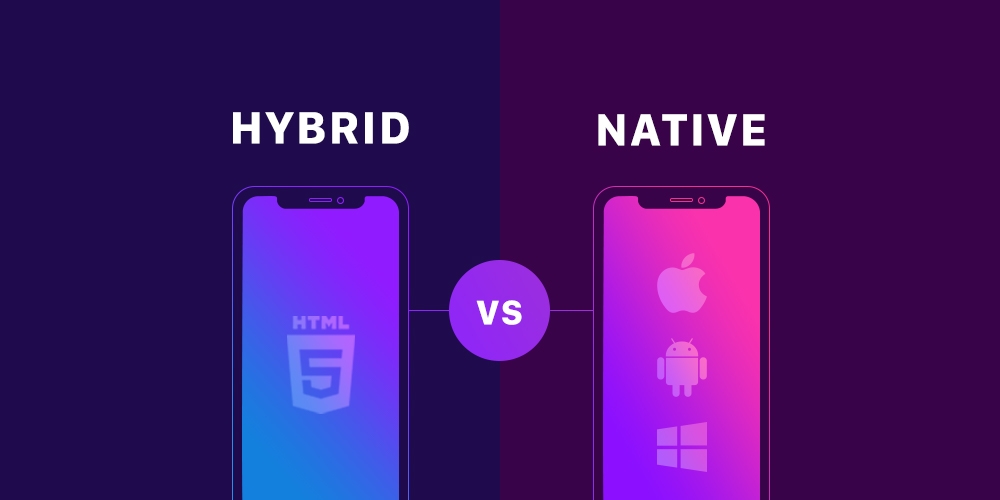Mobile applications drive a lot of businesses today and it’s no fluke. More people are becoming dependent on their devices in planning their day, and executing their daily activities.
As a result of this, there is a demand for more quality mobile applications. But the issue of choosing to either build a hybrid or native application comes up before commencing development.
In this article, you’ll understand what both applications are, their pros and cons and you’ll be able to make a final decision and start building your next mobile application.
Hybrid App Development
A hybrid app is created as a single app for use on multiple platforms such as Android and iOS. They have the look and feel of a native application, but are not native applications.
These apps are created using web technologies such as HTML5, CSS, and JavaScript, instead of regular mobile technologies.
It is a web-based program put in a native app shell and connected to the device hardware. Therefore it consists of two parts:
- The back-end code
- The native shell
The native shell is downloadable and loads the code using a web view
A hybrid app consists of two parts: the first is the back-end code, and the second is a native shell that is downloadable and loads the code using a webview.
Native App Development
Unlike a hybrid application, a native mobile app is created for use on a singular platform or device. Hence, a native application built to work on Android will not work on iOS.
Different platforms have different native programming languages, so instead of using web technologies to build one as seen with hybrid applications, you stick to the programming language for the target platform.
Objective-C or Swift are the native languages for iOS applications; Java, Kotlin are the native languages for Android applications, not leaving out Windows mobile applications which are you can build using C#.
The Pros
In this section, you’ll learn about the advantages of hybrid and native mobile applications. Both applications have their advantages, so your choice is dependent on which advantages apply more to the present situation.
Advantages of Hybrid Applications
These are the advantages of building hybrid applications:
- Decreased Cost of Development: Hybrid applications are great applications if you are on a low development budget. Since app development occurs only once for all the platforms (Android, iOS, Windows) and you don’t need to hire different programmers.
- Maintenance: Hybrid applications are easy to maintain. They are incorporated in a native shell, so they can easily be updated when needed.
- Shorter Time to Market: Hybrid applications are the way to go for short deadlines, as they can be built in a short time.
- One Release for all platforms: Hybrid apps is build to work on multiple platforms. It can be implemented with technology like Cordova.
Advantages of Native Applications
These are the advantages of building native applications:
- Smooth Performance: Native applications work directly with the device, instead of through the web. This brings about smooth application performance.
- Speed: Native applications are very optimized, so it is normal to see them perform well during speed tests. They utilize memory efficiently and are impressively fast.
- User Experience: Users of mobile applications aren’t very patient, hence you need the application to perform smoothly with minimal lags to provide a stunning user experience
- Access to Device Resources: You can implement a ton of features in a native application. This is because native apps have access to all the device utilities such as the Gyroscope, Camera, Accelerometer.
The Cons
In this section, you’ll get to know about the disadvantages of choosing any of both technologies. This will help you decide what trade-offs you’re willing to make while building your next mobile application.
Disadvantages of Hybrid Applications
These are the disadvantages of building hybrid applications:
- Performance: Hybrid applications have tendencies to perform poorly. There is an extra layer between the source code and the target mobile platform, and as a result of this, the app’s performance can suffer.
- Debugging: Debugging is harder on hybrid applications. In many cases, developers can only hope for the hybrid app not to have a terrible bug during the development phase.
- User Experience: It is hard to provide a unique user experience on a hybrid application. The definition of a great user experience varies by devices, so keeping a balance can be difficult.
- Lower Response Rates: The response rate of hybrid applications is lower than that of native applications, and this affects the overall speed of the application.
- Access to Device Resources: it may be really difficult to use the device resources without digging into the native code, so you still may need help from the developers skillful in native programming languages to implement some nonstandard features.
Disadvantages of Native Application
These are the disadvantages of building native applications:
- Time: Native applications take longer to build when compared to hybrid applications.
- Development Cost: To build native applications for different platforms, you’ll need to get programmers with different skill sets. This implies multiple budgets for the multiple target platforms, which incurs more costs than the development of hybrid apps.
Making a Decision
Choosing between a hybrid and a native application can be a tough choice to make, but decisions have to be made for products to be built.
 To make it easier, you should properly analyze the current situation based on time, budget, long-term maintenance, user experience, etc.
To make it easier, you should properly analyze the current situation based on time, budget, long-term maintenance, user experience, etc.
It is advised that you go for hybrid applications if you need to push the application fast and have a tight budget. You can work around the disadvantages of a hybrid application’s performance and speed until you are in a position that suits a native application.
It is best to go with a native application if you have enough resources, this gives a more complete and powerful application. However, you should only go with this if you have enough money to pay developers and can wait till the application is ready to be deployed.
Conclusion
There is no completely perfect answer to your mobile application development questions, as it is all dependent on your current situation.
In this article, you’ve seen what hybrid and native mobile applications are about. The pros and cons of both applications and some help on choosing the one that is right for you.
It is important that you make a choice as soon as possible based on the disadvantages you can work with, without any notable dent to the development of the application. Simply take a decision and get started with the project.



